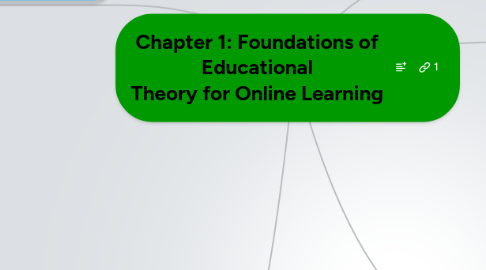
1. Using Behaviorist, Cognitive and Contructivism to Design WBT
1.1. Behaviorist Theory
1.1.1. Implications for Online Learning
1.1.1.1. Outcomes
1.1.1.2. Testing
1.1.1.3. Sequencing
1.1.1.4. Feedback
1.2. Cognitivist Theory
1.2.1. Implications for Online Learning
1.2.1.1. Perceive and attend to information
1.2.1.2. Retrieval
1.2.1.3. Chunking
1.2.1.4. Deep processing
1.2.1.5. Accommodate individual differences and learning styles
1.2.1.5.1. Learning Styles
1.2.1.5.2. Cognitive style
1.2.1.6. Information presentation
1.2.1.6.1. Dual-coding theory
1.2.1.7. Learner motivation
1.2.1.8. Meta cognition
1.2.1.9. Real-life application
1.2.2. Learning Styles
1.3. Constructivist Theory
1.3.1. Implications for Online Learning
1.3.1.1. Active learning
1.3.1.2. Constructing learning
1.3.1.3. Collaborative and cooperative learning
1.3.1.4. Control of learning
1.3.1.5. Reflection
1.3.1.6. Meaningful learning
1.3.1.7. Interactive learning
1.3.2. Transformative learning
1.3.3. Interaction in online learning
1.3.3.1. Learner interface interaction
1.3.3.2. Learner content interaction
1.3.3.3. Learner support interaction
1.3.3.4. Learner-learner, learner-instructor, learner-expert interaction
1.3.3.5. Learner-context interaction
2. Connectivist Theory for Online Learning
2.1. Guidelines to develop materials
2.1.1. Autonomy and independence
2.1.2. Flexibility
2.1.3. Parsing information
2.1.4. Up-to-date materials
2.1.5. Connection to others
2.1.6. Multi-delivery methods
2.1.7. Technology used for learning
2.1.8. Active learning
2.1.9. Networking
2.1.10. Multidisciplinary learning
